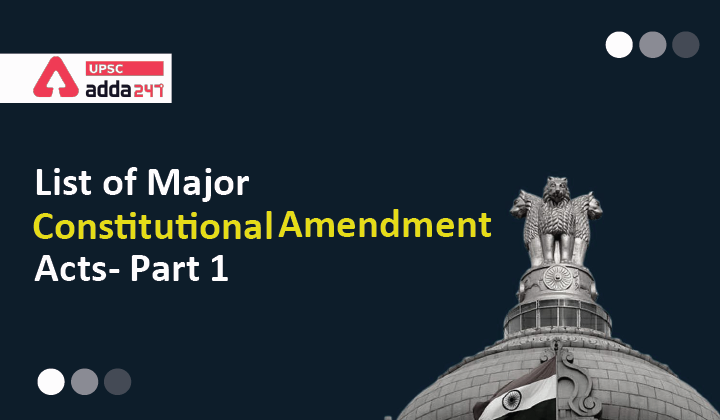| Sr. N. |
Constitutional Amendment Act |
Key Provisions |
| 1. |
First Constitutional Amendment Act, 1951 |
- Empowered the state to make special provisions for the advancement of socially and economically backward classes.
- Provided for the saving of laws providing for the acquisition of estates, etc.
- Ninth Schedule was added to protect the land reforms and other laws included in it from the judicial review.
- Reasonable Restrictions: Added three more grounds of restrictions on freedom of speech and expression-
- Public order
- Friendly relations with foreign states and
- Incitement to an offence.
- Note- It made the restrictions ‘reasonable’ and thus, justiciable in nature.
- Nationalization of Trading: It provided that state trading and nationalization of any trade or business by the state is not to be invalid on the ground of violation of the right to trade or business.
|
| 2. |
Second Constitutional Amendment Act, 1952 |
The scale of representation in the Lok Sabha was readjusted stating that 1 member can represent even more than 7.5 lakh people. |
| 3. |
Fourth Constitutional Amendment Act, 1955 |
- Limiting Judicial Review: Made the scale of compensation given in lieu of compulsory acquisition of private property beyond the scrutiny of courts.
- Authorized the state to nationalise any trade.
- Included some more Acts in the Ninth Schedule.
- Extended the scope of Article 31 A (savings of laws).
|
| 4. |
Seventh Constitutional Amendment Act, 1956 |
- Amended 2nd and 7th Schedule
- Reorganization of States: It abolished the existing classification of states into four categories (Part A, B, C, and D states), and reorganized them into 14 states and 6 union territories.
- Judiciary:
- Extended the jurisdiction of high courts to union territories.
- Provided for the establishment of a common high court for two or more states.
- Provided for the appointment of additional and acting judges of the high court.
|
| 5. |
Ninth Constitutional Amendment Act, 1960 |
- Adjustments to Indian Territory: It facilitated the cession of the Indian territory of Berubari Union (located in West Bengal) to Pakistan as per the Indo-Pakistan Agreement (1958).
|
| 6. |
Tenth Constitutional Amendment Act, 1961 |
- It facilitated the incorporation of Dadra, Nagar, and Haveli in the Union of Indian as a Union Territory.
|
| 7. |
Eleventh Constitutional Amendment Act, 1961 |
- Election of President and Vice President:
- Changed the procedure of election of the vice president: It provided for an electoral college instead of a joint meeting of the two Houses of the Parliament for the election of the Vice President.
- Provided that the election of the President or vice president cannot be challenged on the ground of any vacancy in the appropriate electoral college.
|
| 8. |
Twelfth Constitutional Amendment Act, 1962 |
- Facilitated incorporation of Goa, Daman and Diu in the Indian Union as a Union Territory.
|
| 9. |
Thirteenth Constitutional Amendment Act, 1962 |
- Gave the status of a state to Nagaland and made special provisions for it under Article 371A.
|
| 10. |
Fourteenth Constitutional Amendment Act, 1962 |
- Facilitated incorporation of Puducherry in the Indian Union.
- Provided for the creation of legislatures and council of ministers for the Union Territories of Himachal Pradesh, Manipur, Tripura, Goa, Daman and Diu, and Puducherry.
|




 TSPSC Group 1 Question Paper 2024, Downl...
TSPSC Group 1 Question Paper 2024, Downl...
 TSPSC Group 1 Answer key 2024 Out, Downl...
TSPSC Group 1 Answer key 2024 Out, Downl...
 UPSC Prelims 2024 Question Paper, Downlo...
UPSC Prelims 2024 Question Paper, Downlo...





